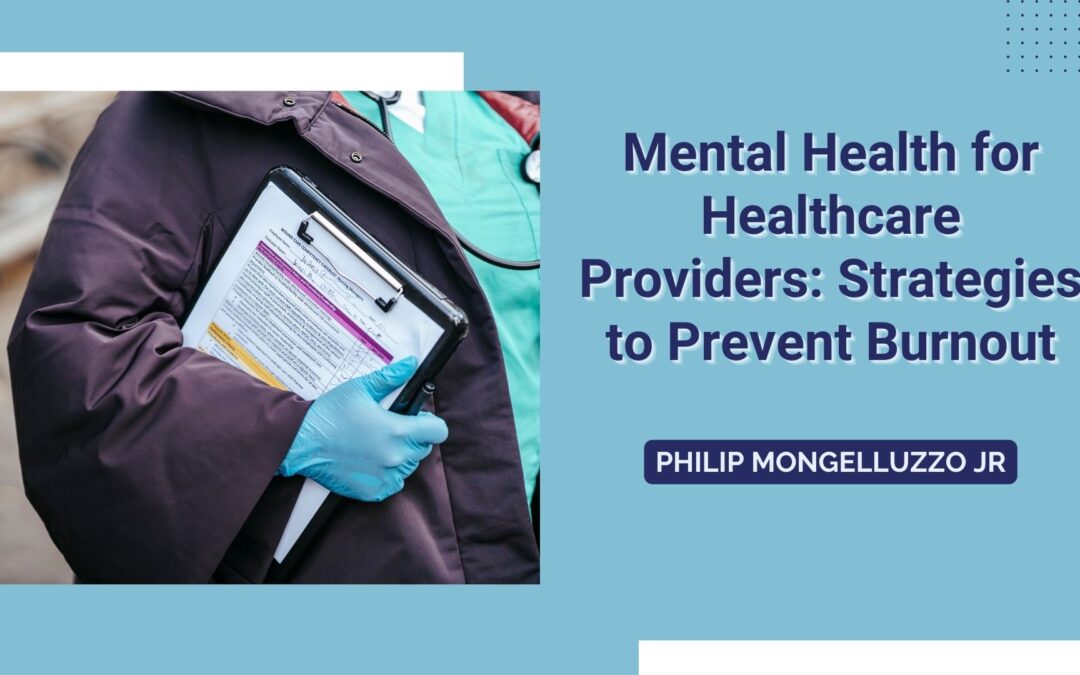Healthcare providers play a crucial role in caring for their patients’ physical and mental well-being. However, the demanding nature of the healthcare profession can take a toll on providers’ mental health. Burnout, characterized by emotional exhaustion, depersonalization, and reduced personal accomplishment, is prevalent among healthcare professionals. In this blog post, we will explore the importance of mental health for healthcare providers and provide strategies to prevent burnout.
The Impact of Burnout on Healthcare Providers
- Quality of Patient Care: Burnout can lead to decreased quality of patient care, as providers may become less empathetic, less attentive, and more prone to errors.
- Physical Health: Burnout is associated with a higher risk of physical health issues, such as cardiovascular disease, gastrointestinal problems, and chronic pain.
- Mental Health: Healthcare professionals experiencing burnout are more susceptible to mental health conditions like anxiety and depression.
- Career Satisfaction: Burnout can lead to decreased job satisfaction and an increased likelihood of leaving the healthcare profession altogether.
Strategies to Prevent Burnout
- Self-Care is Not Selfish: Healthcare providers often prioritize their patients’ needs above their own, but self-care is essential. Allocate time for activities that rejuvenate your mind and body, whether exercise, meditation, reading, or spending time with loved ones. Remember that taking care of yourself enables you to provide better patient care.
- Set Boundaries: Establish clear boundaries between work and personal life. Create a routine that allows you to disconnect from work when you’re not on duty. Avoid checking work-related emails or messages during your time off.
- Seek Support: Don’t hesitate to seek support from colleagues, mentors, or mental health professionals. Talking about your experiences and challenges can provide valuable insights and emotional relief.
- Practice Mindfulness: Mindfulness techniques like meditation and deep breathing exercises can help reduce stress and improve focus. Incorporate mindfulness practices into your daily routine to enhance your overall well-being.
- Prioritize Sleep: Quality sleep is essential for physical and mental health. Establish a regular sleep schedule and create a relaxing bedtime routine. Avoid excessive caffeine and screen time close to bedtime.
- Time Management: Efficient time management can reduce the feeling of being overwhelmed. Use to-do lists, calendars, and scheduling apps to organize your tasks and responsibilities.
- Delegate When Possible: Recognize that you don’t have to do everything alone. Delegate tasks that others can handle, whether administrative work or specific patient care duties.
- Continuous Learning: Stay engaged in ongoing learning and professional development. Acquiring new knowledge and skills can boost confidence and motivation.
- Team Communication: Foster open and honest communication within your healthcare team. Collaborate with colleagues to share insights, support each other, and address challenges collectively.
- Regular Breaks: Take short breaks throughout your workday to recharge. Even a few minutes of stretching or a brief walk can provide mental and physical rejuvenation.
- Celebrate Successes: Acknowledge your achievements, both big and small. Celebrate milestones and successes to boost your self-esteem and sense of accomplishment.
- Time Off: Utilize your vacation and personal days. Taking time off is essential for rejuvenation and preventing burnout.
Institutional Support
In addition to individual strategies, healthcare institutions can also play a significant role in preventing burnout among their providers:
- Mental Health Resources: Offer providers mental health resources, such as counseling services. Normalize seeking mental health support and ensure confidentiality.
- Workload Management: Implement workload management strategies to prevent excessive stress. Consider factors like patient-to-provider ratios and work hours.
- Training and Education: Provide training on stress management, resilience, and self-care. Equip providers with the tools they need to navigate the profession’s challenges.
- Supportive Culture: Foster a culture of support and appreciation within the organization. Recognize and celebrate the efforts and dedication of healthcare providers.
- Flexible Schedules: Consider flexible scheduling options that allow providers to maintain a better work-life balance.
Conclusion
Mental health is a critical aspect of the healthcare profession, and addressing burnout is vital to ensure the well-being of healthcare providers. By implementing strategies that prioritize self-care, set boundaries, seek support, and promote a culture of well-being, healthcare professionals can prevent burnout and continue to provide high-quality care to their patients. Remember that caring for oneself is not selfish but necessary to sustain a fulfilling and impactful healthcare career.

